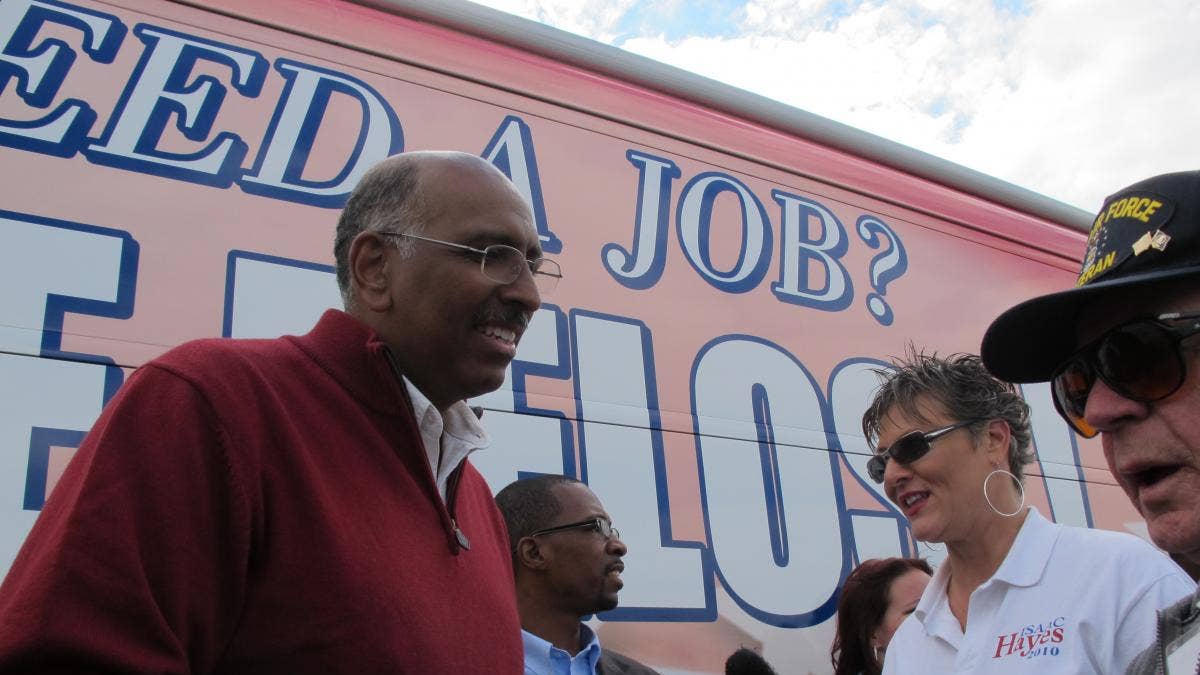
RNC Chairman Michael Steele (left) meets with voters on the party's "Fire Pelosi" tour leading up to the Nov. 4 midterms. (Fox News Photo)
Republican National Committee Chairman Michael Steele is taking credit for the GOP's monumental midterm election results earlier this month—and defending his tenuous position at the top of the party.
Steele released a five-page memo Friday trumpeting the RNC's get-out-the-vote efforts and fundraising successes as essential elements in November fourth's big gains, on the heels of a scathing resignation letter by now-former RNC political director Gentry Collins this week.
The memo, thanking RNC members for their work and contributions, claims the RNC's efforts—not the organic grassroots Tea Party movement—are what drove new and disgruntled voters to the polls.
"[T]he RNC helped achieve what was, by far, the greatest turnout by any party in any midterm election in U.S. history by translating the energy of grass roots conservatives into record turnout for GOP candidates," the document reads.
"The vast surge of Republican voters was possibly only by engaging citizens—overwhelmingly disaffected conservatives—who had not previously been part of the political process."
This turnout, Steele's memo reads, was the highest ever in any midterm by either party—44 million Republican votes; Steele notes the GOP outreach program contacted 45 million people in advance of the election.
Steele acknowledges the precarious position the party has been in since the Tea Party emerged in 2009, saying the risk of a split between conservatives was a real concern, "potentially imperiling the existence of the GOP as a major party."
"From the outset of these grass roots movements, the RNC welcomed the energy and limited government principles of Tea Party voters and grass roots conservatives, and worked hard to ensure that their views found expression within the Republican Party, and not in a potentially ruinous third party movement," the document reads.
But the history of Tea Party-Republican Party relations has been anything but harmonious. Tiffs between rank-and-file Republicans like former Bush advisor Karl Rove and Texas Senator John Cornyn, and Tea Party upstarts like former Alaska Governor Sarah Palin and South Carolina Senator Jim DeMint were common headlines in the months leading up to November 4.
Steele's claim that RNC efforts to accept the grassroots movement led to the midterm victories runs completely opposite to Tea Party sentiments; DeMint told Reuters in a November 11 interview, "There's not one Republican senator who would have been elected without Tea Party support."
Steele has had to defend his role as RNC chairman almost from the start. Taking the helm in 2008 after two successive GOP electoral wallopings, a string of gaffes cast early doubt on Steele's effectiveness as party leader.
The RNC selects its new chairman in January, and several challengers to Steele have already announced their intentions to run.




